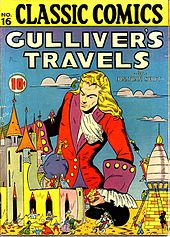Cultural influence of Gulliver's Travels
The names of the speakers in the debates, other individuals mentioned, politicians and monarchs present and past, and most other countries and cities of Europe ("Degulia") and America ("Columbia") were thinly disguised under a variety of Swiftian pseudonyms.
In 1877, Asaph Hall discovered the two real moons of Mars, Deimos and Phobos; in 1973 craters on Deimos were named Swift and Voltaire,[2] and from 2006 numerous features on Phobos were named after elements from Gulliver's Travels, including Laputa Regio, Lagado Planitia, and several craters.
In the Oxford English Dictionary it is considered a definition for "a rude, noisy, or violent person" and its origins attributed to Swift's Gulliver's Travels.
Fyodor Dostoevsky references Gulliver's Travels in his novel Demons (1872): 'In an English satire of the last century, Gulliver, returning from the land of the Lilliputians where the people were only three or four inches high, had grown so accustomed to consider himself a giant among them, that as he walked along the Streets of London he could not help crying out to carriages and passers-by to be careful and get out of his way for fear he should crush them, imagining that they were little and he was still a giant ...' It has been pointed out that the long and vicious war which started after a disagreement about which was the best end to break an egg is an example of the narcissism of small differences, a term Sigmund Freud coined in the early 1900s.
[5] Brian Gulliver's Travels is a satirical comedy series and also a novel created and written by Bill Dare, first broadcast on 21 February 2011 on BBC Radio 4.

